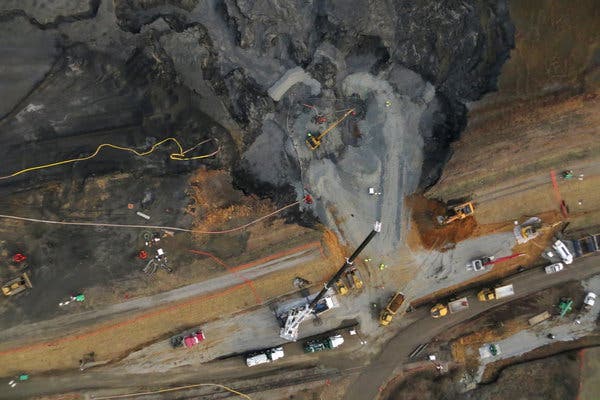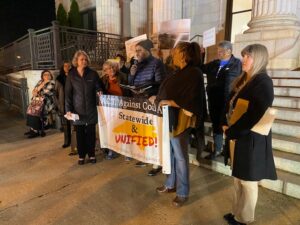Coal ash or Coal Combustion Residuals (CCR) are waste materials produced as a result of burning coal. Coal ash can contain toxic heavy metals and radioactive materials that are hazardous to human health.
There are different types of CCR materials from ultra-fine particles that are captured in smoke stacks, to heavy bottom slag, to the powdery fly ash most associated with the term “coal ash”. The proper use, disposal, and cleanup of toxic coal ash waste are serious concerns for public health and environmental justice, impacting communities and workers across North Carolina and the US.

The site in North Carolina where an accident at a coal ash pond spilled tons of coal ash and wastewater into the Dan River
Coal ash contains toxins can be hazardous to human health if they come into contact with drinking water or are breathed through the air. People are at greater risk when handling coal ash, or at any time the ash becomes exposed to the elements, whether uncovered at the surface or subject to groundwater leaching through improper storage in unlined pits – which can be found at coal-burning facilities around the country.

For many years Clean Water for NC has been an active partner with the statewide Alliance of Carolinians Together (ACT) Against Coal Ash, a community-led alliance of representatives from communities near coal ash sites and landfills. Its formation was in response to the catastrophic Dan River spill in 2014, where Duke Energy’s mismanagement of coal ash resulted in 27 million gallons of untreated wastewater and 39,000 tons of coal ash emptying into the Dan River. Since 2015, this alliance has pushed for cleaner air and water and improved public health for communities burdened with coal ash pollution. Due in part to the organizing efforts of this group along with community presence at public meetings demanding protection from our NC Department of Environmental Quality, our state has taken historic action.
In 2019, the NCDEQ ordered the full excavation of more than 80 million tons of coal ash in North Carolina. Under a settlement agreement with community and environmental groups Duke Energy developed and is moving forward with closure plans at the Allen, Belews Creek, Cliffside, Marshall, Mayo and Roxboro sites, moving coal ash into on-site lined landfills. The terms of that agreement were incorporated into a Consent Order on February 5, 2020.
It is no small victory that this will be the largest coal ash clean up in the nation’s history and will result in greater excavation than in four neighboring states combined.
Still there is work to be done. We must continue to pressure lawmakers around the country to protect coal ash communities and workers and be mindful of the continued potential of coal ash exposure throughout the cleanup process. We must also be sure DEQ and Duke Energy knows we are still watching, and expect full consideration for our safety when considering the ways in which coal ash is handled and reused.
Want to help? Speak up for the following measures:
Safe storage of coal ash! North Carolina ordered Duke Energy to excavate coal ash from unlined pits and move it to onsite lined landfills. This was a huge win for NC communities and should become a model for federal policy.
Disallow any unencapsulated/unsealed use of coal ash! Coal ash is not dirt – it should not be used fill for construction projects, agricultural amendments, or in any form that leaves ash exposed to air or water.
Protection for Workers! We need laws in place that will ensure workers are provided with safety gear and measures to reduce exposure. Without such measures in place, these workers could also inadvertently expose their families to the health hazards of coal ash by carrying it home on work clothing or in vehicles. The utility, not the small contractors tasked to clean up their mess, should be liable for this responsibility.
Resources about Coal Ash in N.C.
- 828 MLK: Coal Ash Remediation Site Information
- Clean Water for NC’s resolution on coal ash (2015)
- A.C.T. Against Coal Ash website
- SE Coal Ash’s Interactive map of coal ash sites
- DEQ Map of Contaminated Drinking Water Well
- DEQ Coal Ash Closure Plans
Should you have any questions or concerns about this program, please contact info@cwfnc.org or call 919-401-9600


